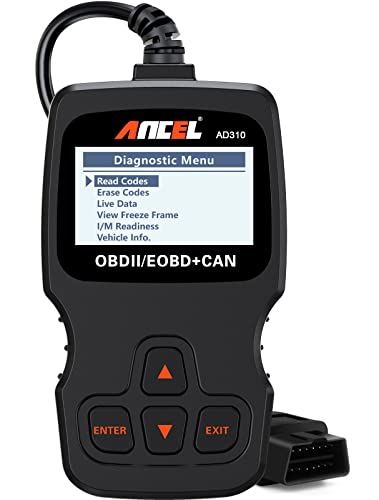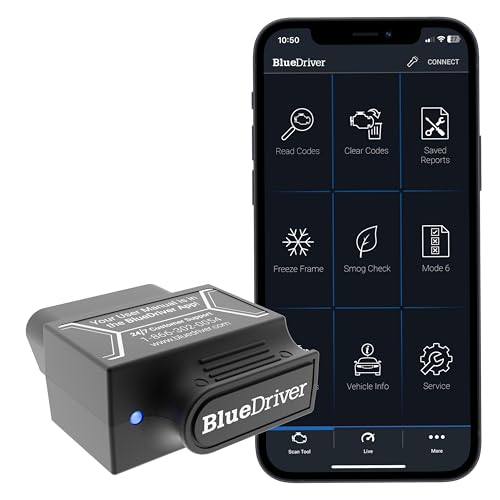There’s a familiar pang of anxiety that hits when the “Check Engine” light illuminates on your dashboard. For many years, that ominous glow meant an immediate, often expensive, trip to the mechanic, followed by the uneasy feeling of not quite knowing what they were fixing or why. The financial burden and uncertainty of potential car issues were always a concern. It was a problem that absolutely needed a practical solution to avoid unnecessary spending and to gain a clearer understanding of my vehicle’s health. Having a tool like the Autel OBD2 Scanner MaxiScan MS300 back then would have saved me countless hours of worry and a significant amount of money.
Key Considerations Before Your OBD2 Scanner Purchase
Before diving into the specifics of any diagnostic tool, it’s worth a moment to consider why you’d even be in the market for an OBD2 scanner. These devices primarily serve to demystify the “Check Engine” light and other related vehicle warnings, ultimately empowering car owners to understand their vehicle’s condition without immediately resorting to professional help. For anyone who has ever felt frustrated by unexpected repair bills or the opaque language of mechanics, an OBD2 scanner is a window into your car’s brain.
The ideal customer for a basic code reader like the Autel MaxiScan MS300 is undoubtedly the DIY enthusiast, the beginner mechanic, or simply the pragmatic car owner who wants to be informed. If you’re someone who likes to tackle minor repairs, pre-diagnose issues before visiting a shop, or ensure your car is ready for an emissions test, this category of product is designed for you. Conversely, this specific scanner isn’t for professional auto technicians who require advanced bi-directional control, live data streaming for multiple sensors simultaneously, or module-specific coding capabilities. Those individuals would need to invest in significantly more expensive, sophisticated diagnostic systems. For the average car owner, however, the critical considerations boil down to vehicle compatibility, ease of use, the core diagnostic features offered (reading/clearing codes, I/M readiness), overall value, and portability.
- CEL Doctor: The ANCEL AD310 is one of the best-selling OBD II scanners on the market and is recommended by Scotty Kilmer, a YouTuber and auto mechanic. It can easily determine the cause of the check...
- Multi-Functions - Practical Multi-Functions OBD2 code reader features built-in OBD2 DTC lookup library, which help you to determine the cause of the engine light, read code, erase code, view freeze...
- [Pro OBD2 Scanner] - BlueDriver is the easiest way to scan and understand your vehicle like a professional mechanic. Read and clear your car’s trouble codes and check engine light.
Introducing the Autel MaxiScan MS300
The Autel OBD2 Scanner MaxiScan MS300 is a compact, plug-and-play handheld code reader designed to simplify vehicle diagnostics for the everyday driver. Its core promise is straightforward: to help you quickly identify the root cause of your “Check Engine” light, clear diagnostic trouble codes (DTCs), and check your car’s emission readiness status. When you purchase the MS300, you receive the device itself, complete with a standard 16-PIN OBD2 cable, ready for immediate use straight out of the box.
Compared to high-end diagnostic tools, even within Autel’s own extensive lineup (like the MaxiCOM or MaxiPRO series), the MS300 is notably basic. It doesn’t offer complex live data graphs, advanced module coding, or bi-directional controls. However, that’s precisely its strength for its target audience. It’s not trying to be a mechanic’s workstation; it’s a simple, effective tool for car DIYers and beginners. It’s for anyone who owns an OBDII-compliant vehicle after 1996 and wants a quick, no-fuss way to read and clear basic engine codes. It’s not for those requiring in-depth, manufacturer-specific diagnostics or complex system analysis.
Here’s a quick rundown of its primary attributes:
Pros:
* Extremely cost-effective, often paying for itself after just one use by preventing unnecessary mechanic visits.
* Remarkably easy to use, featuring a true plug-and-play design with no batteries or complicated setup required.
* Quickly reads and clears generic and manufacturer-specific Diagnostic Trouble Codes (DTCs).
* Effectively turns off the Check Engine Light, restoring peace of mind.
* Retrieves I/M Readiness status, crucial for passing annual smog checks.
* Boasts broad compatibility with nearly all OBDII-compliant vehicles.
Cons:
* Offers basic functionality; lacks advanced features like live data streaming, graphing, or bi-directional controls found in professional scanners.
* The 2.8-inch screen is small and displays limited information at once.
* Some users report difficulties finding manuals online or getting direct customer support via phone.
* While broadly compatible, a few isolated reports suggest minor compatibility quirks with specific older or luxury vehicle models.
* Some users have noted the absence of the “Autel” brand explicitly printed on the product or packaging, which can be a minor concern for brand assurance.
Deep Dive into Features and Their Advantages
Having used the Autel OBD2 Scanner MaxiScan MS300 for an extended period, I can confidently attest to how well its features translate into tangible benefits for the average car owner. It’s not just a gadget; it’s a practical, problem-solving tool.
Effortless Diagnostic Trouble Code (DTC) Retrieval and Clearing
The core function of the MaxiScan MS300 is its ability to swiftly read and clear Diagnostic Trouble Codes. When your Check Engine Light comes on, it’s typically because the car’s onboard computer has detected a fault and stored a DTC. Prior to owning this scanner, a trip to the local auto parts store for a free scan was the only option, or worse, heading straight to a mechanic. With the MS300, I simply plug it into my car’s OBD2 port (usually located under the dash), turn the ignition on, and within seconds, the device displays the code.
The real benefit here is empowerment. Knowing the code immediately gives you crucial information. For instance, I once had a P0496 code pop up. A quick online search revealed it pointed to an EVAP purge valve issue. Instead of taking it to a dealer and potentially paying hundreds for diagnosis and repair, I was able to order the part for a fraction of the cost, replace it myself in about half an hour, and save a considerable amount of money – easily $300 or more. This ability to pinpoint the problem area lets you determine if it’s something you can handle, or at least go into a mechanic’s shop with an informed understanding, preventing potential overcharges.
Silencing that Annoying Check Engine Light (CEL)
The Check Engine Light (CEL) is, without a doubt, one of the most annoying indicators on any dashboard. Often, it’s triggered by something minor, like a loose gas cap. I recall instances where a simple gas cap not being tightened properly would trigger the light, leading to unnecessary worry. With the MS300, once the underlying issue (be it a loose cap or a replaced part) is addressed, you can use the scanner to clear the associated DTC. This action instantly turns off the CEL, providing immediate peace of mind and confirming that the repair or correction has been successful. It’s immensely satisfying to see that light vanish without an expensive trip to the dealership. It also prevents the annoyance of driving around with a persistent, non-critical warning light.
Mastering the Annual Smog Check with I/M Readiness
Passing an annual smog check or emissions test can be a source of anxiety. Cars are often required to have their OBDII Readiness Monitors set to “Ready” status to pass. If these monitors haven’t completed their self-tests, you risk failing the inspection and having to pay for a re-test. The Autel MS300 provides a fantastic solution by allowing you to retrieve your vehicle’s I/M Readiness status. This means you can check the status of critical monitors such as misfire, fuel system, catalyst, O2 sensors, and EVAP before you even head to the test center. This proactive check ensures your car is truly prepared, saving you both time and the frustration of a failed inspection. It’s a small feature that offers huge practical value.
True Plug-and-Play Simplicity
One of the most appealing aspects of the Autel MS300 is its unparalleled ease of use. This isn’t a complex piece of equipment requiring batteries, software installations, or intricate setups. It’s powered directly by your vehicle’s OBD2 port. The process is incredibly straightforward: turn the ignition off, plug the MS300 into the 16-PIN port, wait for the screen to light up, turn the ignition on (engine off), and press “ENTER.” That’s it. There are no complicated menus or confusing buttons. This ‘plug and play’ nature makes it accessible even to those with absolutely no prior experience in automotive diagnostics, ensuring immediate and hassle-free operation every time.
Broad Vehicle Compatibility
A diagnostic tool is only as useful as the number of vehicles it can service. The Autel OBD2 Scanner is designed to be universally compatible with 99% of OBDII-compliant vehicles. This means it supports all OBD2 protocols, including KWP2000, ISO2000, ISO9141, J1850 VPW, J1850 PWM, and CAN. For the US market, this typically means passenger cars and light trucks manufactured after 1996. For the EU market, it generally covers vehicles post-2006, and for the Asian market, post-2009. This wide-ranging compatibility means that whether you have an older sedan or a newer light truck, there’s a very high probability this compact tool will work for your diagnostic needs. I’ve personally used it across different makes and models with consistent success, making it a versatile addition to any garage.
Compact and Portable Design
While not explicitly listed as a feature, the physical design of the Autel MaxiScan MS300 is a significant benefit. Its small, pocket-sized form factor means it can easily be stored in a glove compartment, a toolbox, or even a backpack. This portability ensures that the scanner is always on hand when you need it, whether you’re at home, on a road trip, or helping out a friend with their car. Its robust construction also suggests it can withstand the typical knocks and bumps of being carried around.
What Real Users Are Saying (Social Proof)
Having scoured the internet, it’s clear that many users share similar positive experiences with the Autel MS300, alongside a few points of contention. Numerous individuals have lauded its ability to quickly read and clear check engine lights, often saving them hundreds of dollars on diagnostic fees and repairs by enabling them to perform simple fixes themselves. One user specifically highlighted identifying a P0496 code, leading to a cheap DIY replacement of an EVAP purge valve that saved them a significant amount. Its straightforward, plug-and-play operation is a consistent theme in positive feedback, making it a favorite for beginners. Impressively, some users reported its effectiveness even with specific issues, such as diagnosing a hybrid battery pack DTC in a 2007 Prius, where other basic scanners had failed. Its utility in simply resetting the CEL after a part replacement, as recommended by auto parts stores, is also highly valued. Many also appreciate its compact size, making it a convenient tool to keep handy for unexpected issues or for regular home mechanics.
However, the feedback isn’t universally glowing. A few users encountered compatibility issues with specific vehicles, such as a 2010 Mercedes-Benz 350, where the device reported incompatibility. Some also expressed frustration with Autel’s customer support, citing difficulty finding the manual online and an inability to connect with telephonic assistance. There were also isolated reports of units arriving defective, though these appear to be less common.
Final Thoughts and Recommendation
The perennial challenge of unexpected car problems – the dread of the illuminated “Check Engine” light, the uncertainty of repair costs, and the fear of being overcharged – is a reality for many vehicle owners. Without a reliable diagnostic tool, these complications can lead to significant financial strain, unnecessary stress, and even potential safety concerns if an issue goes unaddressed.
The Autel MaxiScan MS300 stands out as an exceptional solution to these common dilemmas. Firstly, its affordability and accessibility bring diagnostic power directly into the hands of the everyday driver, making professional-level insights incredibly budget-friendly. Secondly, its simple, user-friendly operation ensures that anyone, regardless of their mechanical aptitude, can quickly and effectively identify what’s going on under the hood. Finally, by empowering DIY repairs and providing crucial information, this Autel OBD2 Scanner helps prevent you from being “ripped off” at the repair shop and keeps your vehicle running smoothly. For peace of mind and significant savings, it’s truly a valuable investment. To learn more and get yours, click here to check it out!
Last update on 2025-11-15 / Affiliate links / Images from Amazon Product Advertising API



